Spanish Flu ravishes Japanese Community in Hawaii
The following are chapters or part or parts of chapters from Picture Bride – The Flu came in two waves 1918 & 1920
Chapter 61
Soaking in the ofuro weeks later, Haru massaged her abdomen as she felt the soft kicks of her fetus reminding her how fortunate she had been during the Spanish flu threat. Ualani, two townspeople, and three Filipino plantation workers had been the only Waimea fatalities. The flu strain had been relatively mild. While a new more virulent strain was moving across America, Haru’s entire family was now immune. Buddha had rewarded her forgiveness. Ko had been nurse, cook, and housecleaner during the two weeks of recovery. She now thought of Ko as her sister. Haru felt another kick. Although the doctor estimated she was in her seventh month, the frequent kicking and size of her belly told her it was closer to eight months.
The hot water soothed her, mitigating her worries of the upcoming birth and voyage to Molokai to retrieve Ume’s baby. She switched her thoughts to her newest business notion. And that’s when the tub shook, sloshing water out and bringing her reverie to an abrupt halt. Haru gripped the sides of the ofuro, held her breath, and waited for the next tremor, which never came. Her breathing eased. It hadn’t been much of a temblor—just a Pele reminder that she could move the earth when it suited her, maybe a warning of a lull before the storm. Two gathering storms, Haru thought.
The storms had been simmering since her Armistice Day flight to visit Ume. Now, five months later and as spring rolled around, they had begun to rumble like Mauna Kea. A labor eruption and legislative attempts to ban Japanese language schools loomed ahead of them.
Plantation owners vowed publicly not to give into “Bolshevik labor demands” and hurried the harvest. Fujimoto was leading efforts to build a strike fund from field workers and soliciting the Japanese business community. He had told Kenji, “We will strike if demands for fair wages are not met.”
Kenji preached patience to the workers while telling Bilkerton, “If the plantations don’t raise wages a little bit, the consequences will be disastrous for everyone.”
Bilkerton’s standard response was, “Sure, sugar prices are high now, but that won’t last. Besides, no matter what concession we make, your people will ask for more. So what’s the point in giving in even a little bit?”
Chapter 87
Sunny skies and the laughter of children gave a lift to Haru rinsing lettuce leaves along with two other wives sitting on upturned buckets at the water pump until a breathless Sachi came running toward her. Splattered red splotches hopscotched across the front of her pale-green yukata. “Setsu Kurume is puking blood!”
Haru stared at the blood spots. She grimaced. She hoped it wasn’t what she thought it was—the Spanish flu. “Change into a fresh yukata after you go to the ofuro. Then, boil the one you are wearing.” Haru looked at the two distressed wives. “I’m off to see Setsu.” On her second hurried step, she stopped abruptly. “Someone ask Sam to join me.”
By now, Haru knew the name of each family and where each was located. While most refugees slept in tents, the Kurume family was one of eight lucky families crammed inside the temple’s school annex. Not so lucky now—for them or the other seven families.
After retrieving the medical kit Dr. Tebbits had given her, Haru dashed to the school annex while recalling the doctor’s admonishment when the pandemic returned to Honolulu shortly after the strike began. “If the flu attacks,” he said with the resignation of one who expected it would, “set up an isolation area immediately.”
“When I got sick the year the war ended, the disease left quickly,” said Haru.
“I remember,” said Tebbits. “It didn’t seem so at the time, but you and Kenji were fortunate. Your attack was mild.”
“Immunity,” said Haru letting Tebbits know she remembered an earlier talk. “Why has it come back?”
“The strike restarted the killing—just as the Advertiser predicted,” Tebbits said, referring to a December front-page editorial demanding that owners and unions put the health of the community above their selfish interests. “The disease had pretty much run its course. But now all these strikers jammed together . . .” He let the thought hang.
Haru parted the hanging bed-sheet entrance of the Kurume space. Ignoring the stench, she knelt beside Setsu who managed a mute smile. The dripping mucus from her nostrils, along with the damp red stains around her ear canals and the bluish tint to her face, told Haru that Setsu would most likely be the camp’s first death. By instinct, Haru put her hand on Setsu’s forehead, felt the dry heat, and then reached into her first aid bag for a thermometer. While she waited the required five minutes for Setsu’s body temperature to register, she sponged the woman’s face with a damp cloth.
When Sam arrived a few minutes later, he took one look and shook his head.
“Sam, you know what must be done.”
“I will have the building cleared in an hour,” said Sam. “This will be our hospital.”
The nearest neighbor, overhearing the exchange, started to protest.
Sam pivoted, anger rising in his voice. “Even if you move now, it may be too late for some of you. I have seen this before. I survived my attack. Many of my comrades didn’t.”
The neighbor drew back as if Sam had pushed him.
Raising his voice so everyone could hear, Sam ordered, “Start packing. I will arrange for tents in the clearing behind the tree line. You will have to stay isolated for three days. We will bring food and build your own latrine.”
He stepped back inside the Kurumes’ draped enclosure as Haru pulled the thermometer from Setsu’s mouth. She held it up to the window light. “One hundred four point eight,” she said in a tone just above a whisper. Haru felt a tug on her apron and looked down to find a young boy dressed in trousers that slopped over his heels.
“Is Mommy going to die?”
Haru squatted and hugged the boy. “Can you go to the stream with a towel, soak it in the cool water, and bring it to your mommy to keep her head cool?”
The boy nodded, picked up a towel, and dashed off.
She looked at the forlorn face of Setsu’s husband who had just entered.
The next evening Setsu was buried; three days later her, husband followed her to the grave. Then the oldest child. A family from Setsu’s village took in the surviving children, now immune.

Pic one of many strike rallies during Spanish Flu epidemic
Chapter 88
On the third Friday of April, the strike was entering its third month. Haru’s camp started each day with morning exercises to the rousing slogans of “no fair pay; no work” and “we will never give up,” even as their stomachs and crying children gnawed at their resolve. Deep-pocketed owners hired scabs from California and Manila to bring sugar production to 60 percent of the pre-strike level.
At midmorning, Haru introduced a newcomer to a garden detail. “This is Abe-san. He’s had a little trouble with the Honolulu police.”
Not exactly inaccurate, thought the man in a tattered shirt. The police are certainly looking for an excuse to arrest me.
Knowing that the last thing anyone wanted was another mouth to feed, Haru added, “Abe–san has brought two fifty-pound bags of rice with him.”
The scruffily dressed man wore thick-rimmed spectacles. No one noticed that the eyeglasses were clear, lacking in magnification. The rim of his tattered bowler was tilted onto his eyebrows. His four-day beard set him apart from the clean-shaven campsite squatters. No one made the connection between this beaten-down laborer and the big event scheduled for that evening. He picked up an idle hoe and began loosening the earth around tomato plants. While his defiant face had appeared frequently in the Japanese press, his photos always showed him dressed in a black suit, white shirt, and narrow black tie. The man loved his Shakespeare, particularly Henry V. Hoeing with the strikers, he imagined himself on the eve of the Battle of Agincourt, traipsing around his camp in a tradesman’s foul attire to listen to the temper of his soldiers. He glanced at his sweat-stained leather-band watch. “I’m hungry. When do we get lunch?”
“Are you fat guys from Honolulu still getting three meals a day?” a worker laughed in an accusative voice.
A squat man, weeding among the tomatoes, said, “My children are missing their school and sweet cakes.”
“No school in this camp?” the man asked, knowing that when the pandemic struck, the school board forbade children of strikers to attend school.
“That’s our school,” said the squat man in a derisive tone while pointing to where kids formed little circles around the fruit trees.
A man scooping weeds into a wheelbarrow stood up. “At least you have your children.” No one asked what he meant. The Spanish flu had killed eighteen camp squatters, mostly younger adults, but a few children as well. He eyed the newcomer. “We were told our fat-cat business people would support us. But we have a morsel of meat only once every two days, while our big-shot union leaders eat and drink at Honolulu’s best restaurants with money meant for our stomachs.”
The newcomer gripped his hoe’s handle hard. He regretted the time the steering committee had eaten at Honolulu’s best sushi restaurant. Someone had alerted the Advertiser. Pafko and a photographer had rushed to the Chiba-ken. The picture of a cigar-smoking Tsutsumi with his tie askew and bottle of Jim Beam in front of him made the front page. It was the only time the union committee dined well, thought Tsutsumi, but once was one time too many.
Tsutsumi moved from group to group the rest of the afternoon.
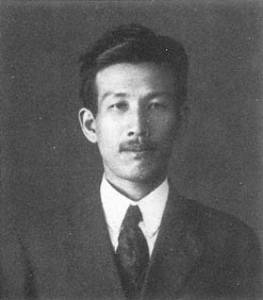
“I remember 1909. We had big dreams then. What happened? We crawled back to work, broke after winning a few minor concessions to give our union leaders face.”
“How long can we hold out?”
“Ichiro Matsui left in the middle of the night yesterday. He told his younger brother he would be getting three dollars a day working in Hilo. They had a fight. His brother stayed, but I wonder if the older Matsui isn’t the smart one.”
Tsutsumi moseyed over to Haru’s kitchen door that was shooting out heat. Inside, Haru was scooping out the last of the floured vegetables from a boiling tempura vat. “I’ve heard enough,” said Tsutsumi brusquely. “I know what to say tonight. Can you pick me up at the Tebbits clinic in two hours?” After he explained why he needed a ride, he shuffled down the street. Once out of sight, he dropped his stumblebum character and strode with purpose.
Standing at her living room window, Haru studied Tsutsumi until he disappeared. Something about the man nagged at her. While she admired his organizational skills, she regretted that the face of the cane workers union never swung a machete, was an outsider who had arrived in the islands just three years ago. Was he a man who saw the plight of the workers and was moved to help them, or did he see a chance to make a name for himself? He had arrived as a low-paid schoolteacher and was now the owner of a thriving newspaper and the paid leader of the union. She thought of the great-grandparents of the rapacious sugar barons who had come to Hawaii in gingham broadcloth to introduce the word of their God and ended up owning the island while decimating the Hawaiian population.
Taiko drummers marching up her porch steps broke her thought. She waved when they spotted her through the window. Haru watched them set down their waist-high drums, assume their feet-apart stance, and begin their ritual. The slow cadence reminded Haru of distant drumbeats from so long ago—drumbeats from the Hiroshima Harbor that could even be heard at the Takayama Temple up on the hill. Their slow, steady, military tempo had signaled an arriving or departing warship.
She’d better visit the ofuro and change into a clean kimono.
Chapter 94
“We have the owners on the run and your meddling priest goes to a haole church,” said Tsutsumi, throwing back a jigger of whiskey. The no-alcohol rule had gone by the wayside as the strike dragged on. The Honolulu union headquarters had been cleaned up for the visiting union leaders, but tobacco smoke still hugged the ceiling like San Francisco fog.
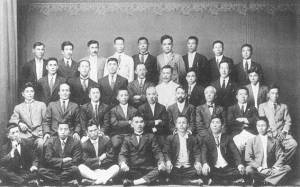
(Pic – 1920 sugar strike leaders …Japanese and Filipino’s)
“Meddling priest?” challenged Oki Tama. “The owners did not offer the new bonus program until the Honolulu churches echoed Adams’s sermon. In a few face-saving months from now, we will have our wages adjusted close to what you called for in your editorials.” He paused and then snorted, “On the run? Sugar production rises weekly.”
“There are things you don’t understand,” said Tsutsumi with another irritating wave of the wrist signaling he had heard enough.
Oki Tama stood up. “Then maybe you shouldn’t have brought me to Honolulu.” The anger in his voice silenced side conversations. The clinking of glasses stopped. “You shouldn’t have paraded me at all your meetings. I am more than a scarred face whose child and wife were murdered.” He jabbed his finger into his chest. “I have EARNED my right to speak here.”
Shinseki, a bull-necked Maui union leader, broke the standoff. “Let’s not do the work of the Sugar Association.” His gravelly voice created the desired calming effect. “We have enough problems. The good rains favor the owners; they don’t need laborers hoeing the irrigation ditches. The Spanish flu ravaged our squatter camps.

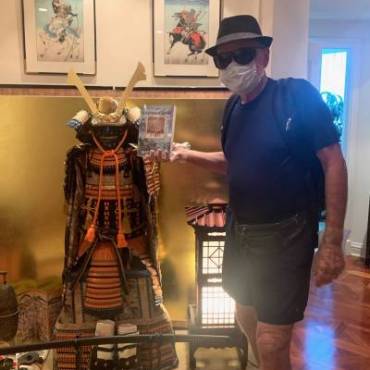
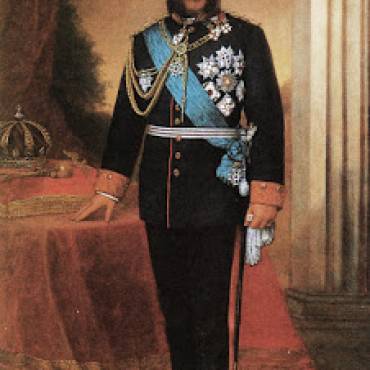
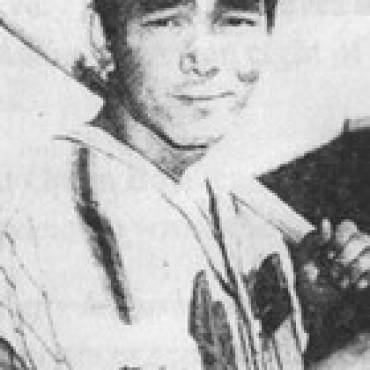
Add Comment